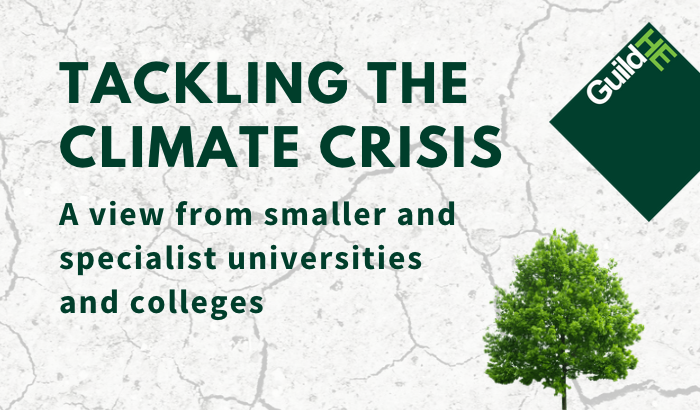GuildHE is launching a new report today ‘Tackling the Climate Crisis’ authored by Dr Alex Bols, Deputy CEO, GuildHE, which provides an in depth insight into how smaller and specialist universities and colleges within the UK are engaging with the issue at an institutional level. The report considers five critical elements of university activity: Leadership and Governance, Teaching, Research and Knowledge Exchange, Community Engagement, and Campus Management.
The report suggests that there has been an acceleration in activities amongst universities and colleges over the last 18 months. Activities to tackle the climate crisis have become further embedded across institutions and at a more strategic level, with more institutions integrating environmental sustainable development in their curriculum, working with their local communities and developing research activities in addition to considering how they make their estate more sustainable.
The report is based on a survey of members in Spring this year to identify progress since our previous survey 18 months ago and to map engagement. It showcases eleven examples of how our member universities and colleges have been addressing these issues, from the University of Worcester’s community recycling scheme with schools and a housing association provider to Abertay University’s PhD work which grew to an award-winning project creating the world’s first climate positive gin from the humble garden pea.
In the 18 months since the previous survey the report shows a significant acceleration in the engagement and activity of universities and colleges with a number of statistics standing out:
-
Environmental sustainability is becoming more embedded across institutions with 45% responding that their strategy is overseen by an institution-wide committee, a jump from 27% in 2021.
-
53% said that their strategy was aligned to the UN Sustainable Development Goals. This is a significant increase since 2021 when only 29% agreed that they were aligned to the SDGs .
-
The survey showed that over 60% have some engagement with their local community groups and businesses, with another 16% looking to expand activity.
-
68% of institutions responded that they had embedded environmental sustainable development in the teaching curriculum in some or all of their courses.
-
80% of institutions have assessed their procurement processes (up from 58%) and two thirds have considered campus biodiversity (up from 38%).
-
The key barriers to further engagement are finances and the costs (cited by 84% of respondents) and 71% citing staffing.

